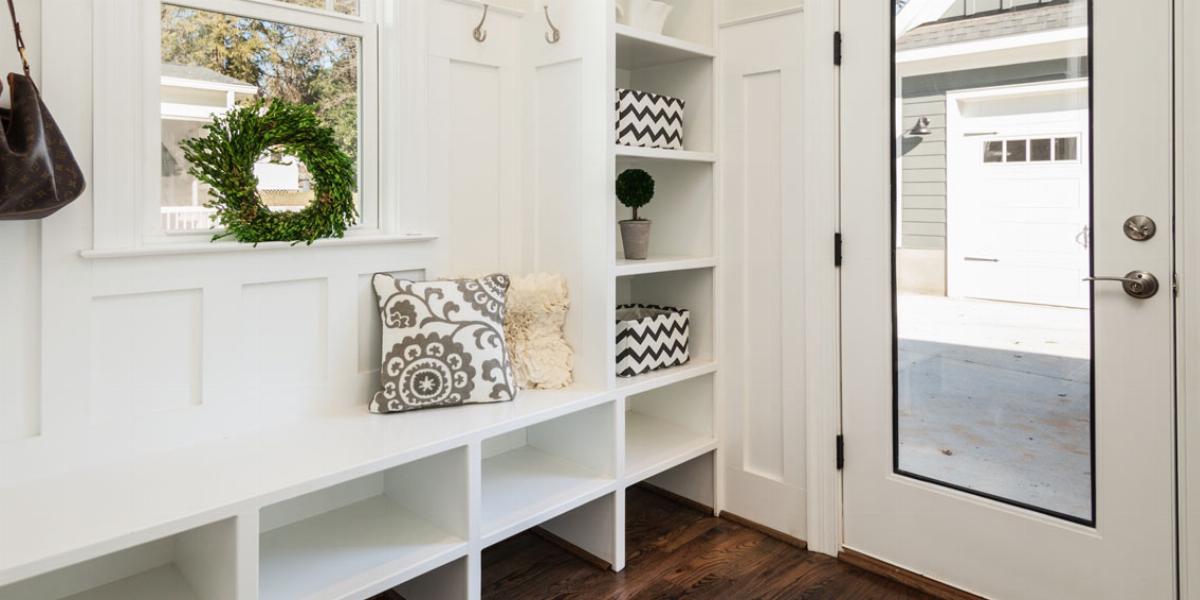
When your mudroom emphasizes “mud” instead of “room,” it’s time to carve out some time to clean and organize.
If you dream of a room where you can easily find your keys without tripping over piles of shoes, and your children’s schoolwork and sports gear stays neat and tidy, follow these simple mudroom organization tips we put together with help from professional organizers Lili Pettit and Amy Trager.
Do you have more shoes than cubbies? Or more coats than coat hooks? Go through your space as-is and take note of everything that doesn’t fit. Your mudroom may be mostly organized except for an unruly stack of mail or your children’s school supplies. It’s also helpful to measure any underutilized space. You may have room for an extra storage bench or an additional row of coat hooks.

“So many homes don’t have an actual room for this purpose, so it’s built into part of the hallway or a couple hooks on the wall. Take stock of what kind of space – horizontal and vertical – you have to use for this purpose. Then take into account how many people will likely use it regularly. From there, you can really start to plan for your needs.”
Amy Trager, CPO | AmyTrager.com
Now, categorize everything into common groupings. Each of these groups will need to have a designated home, either in your mudroom or elsewhere. Everything you plan on keeping in the mudroom should fit within your current space.
What Should Go In a Mudroom:
Nothing should be kept in the mudroom that you won’t use on a weekly – preferably daily – basis.

"Generally speaking, a mudroom will be close to a garage or an entry and exit point of the home. If there are things in there that don’t correspond to being taken out, they should be relocated."
Lili Pettit | Clutter Healing
Empty every bin, cubby, locker and basket to find the stuff that doesn’t fit a mudroom’s purpose. Look for out-of-season items that can be easily relocated to a storage area in the basement, garage or attic.
In addition to trash bags for the junk, as you declutter, Pettit suggests designating an area for items that can be donated and paper that can be shredded.
Amy Trager recommends that you take a look at what items are “regularly coming in and out of the house,” when choosing between storage options. “This will change by season in most parts of the country, but it usually includes coats, shoes, bags and keys. So there’s a need for those items to go somewhere – a cubby, a hook on the wall, a shoe tree or a coat rack.”
| Types of Clutter | Mudroom Organization Solutions |
| Jackets & Coats |
|
| Sporting Equipment & School Supplies |
|
| Miscellaneous Items |
|
Label all bins and baskets with who or what they belong to. For example, it’s more efficient to have a labeled basket for each person in the household’s winter gloves, hats and scarves. Putting them all in one bin leads to mis-matched mittens and general disorder.
Whichever storage systems you choose, and however you divide them between individual and communal use, remember how much space you have available.
Whether it takes the form of a message board or a chalkboard calendar on the wall, a “command center” will help you keep track of family events, sport seasons, school breaks and more. This will also help you keep track of what materials make sense in your mudroom at a given time and when you can remove them.

“For some, everything’s in a shared calendar online, with shopping lists and whatever else you might need built-in. However, many families still like to have one place to keep calendars, assignments, invitations and the like. Not only does everyone know where to find the info they’re looking for, but if there’s a home for these items, they are much less likely to be lost or forgotten about.”
Amy Trager, CPO | AmyTrager.com
No matter which system you use, commit to updating it to stay organized. Once soccer season is over, move the cleats and goalie gloves to storage. The same principle applies for school backpacks and clothing during the summer.
According to Pettit, “organization is a state of being and not something that you get.” She recommends setting aside time each week to declutter and maintain an organized mudroom.
Now that your entryway is taken care of, tackle clutter in the rest of your home! Read our simple home organization rules or click the banner below for a day-by-day guide to get your home clutter-free.
